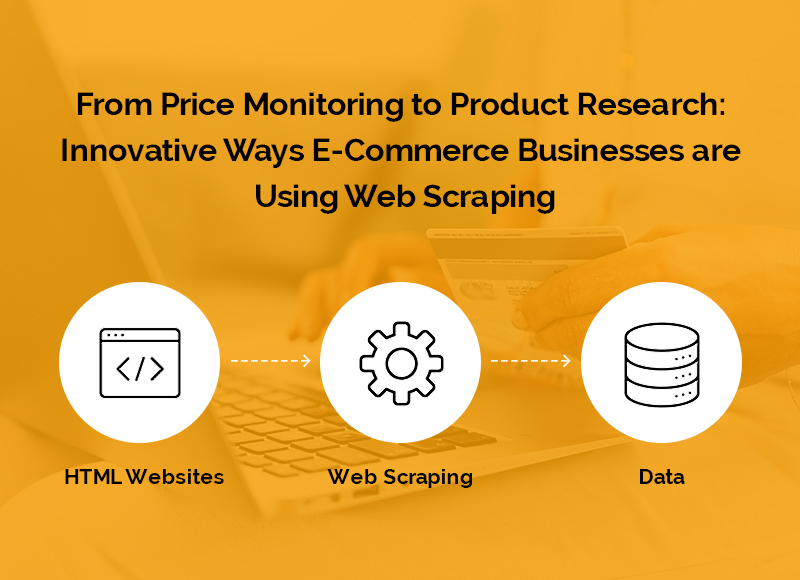Table of Contents
Explore how E-Commerce harnesses web scraping: Price Monitoring, Product Research & more. Innovative strategies for success!

Data holds the key to understanding many aspects of e-commerce. For example, market trends, keywords, and consumer behaviors are all readily available if you know where to find them — and that’s exactly where web scraping comes in. Suppose you want to take your e-commerce store to the next level. In that case, it might be time to leverage this dynamic technology to uncover valuable insights and empower data-driven decisions.
Here’s all you need to know about using web scraping in the e-commerce industry.
What Is E-commerce Web Scraping?
E-commerce web scraping involves extracting large amounts of data from various e-commerce websites using a tool known as a “scraper.” Scripts and bots navigate through the web pages of online retail platforms, gather specific information, and compile it into a structured format so you can easily use this valuable data—saving you heaps of time compared with doing this manually.
This process can enable you to access all kinds of data — for e-commerce business owners, scraping information about competitor pricing or customer reviews can prove especially valuable. But it’s not just about comparing your business to competitors; web scraping builds a better understanding of market dynamics, consumer behavior, and competitive landscapes — three important areas you shouldn’t overlook.
Is Web Scraping Safe and Accurate?
Web scraping can be both beneficial and potentially risky for e-commerce businesses, depending on how it’s implemented and used. The valuable information that you can gather should always be collected ethically, so you should use the best residential proxy that is designed for data retrieval and is both reliable and structured.
You should also be mindful that relying solely on scraped data might lead to inaccuracies or outdated information. To avoid this, web scraping should be used as a support rather than the leading method for decision making — assess all collected data thoroughly, and limit the amount of scraping you do to get the best results.
How Can Web Scraping be Used in e-commerce?
Whether you’re looking for specific data or simply require a general overview of your market, there are multiple use cases for web scraping for online store owners. The more you use the technology, the more functions you’ll likely discover.
Here are some of the most common ways that web scraping tools are used by e-commerce businesses:
Price Monitoring
How do you ensure your products are priced competitively? Of course, you need to consider your own margins as well as the quality of the product, but it’s a good idea to monitor price trends across the market. Web scraping allows e-commerce businesses to gain insight into product prices across multiple platforms, including Amazon, (find out more in ScrapingBee’s guide to scraping Amazon prices), Etsy, eBay, or simply competitors’ your websites.
With this insight, businesses can adjust their own pricing strategies to remain competitive in the market. This enables dynamic pricing adjustments and ensures optimal profit margins while appealing to price-sensitive consumers.
Trend Forecasting
If you want to get ahead of the competition and start selling the latest must-have product, you need to have your finger on the pulse and your ears listening to the right conversations. For this, you can employ web scraping for social listening — enabling you to spot mentions, hashtags, and discussions related to specific topics or industries and uncover emerging trends.
Alternatively, by scraping data from industry influencers, thought leaders, and experts, you can gain valuable insights into their opinions, predictions, and endorsements. Tracking their discussions can reveal trends they are enthusiastic about, and you can utilize this to give your website an SEO boost, as searches for particular products start to increase.
Product-Related Insights
Unsure how to market your product to consumers? Struggling to formulate your product descriptions? Scraping product descriptions from competitors’ websites can show you which features they choose to highlight, perhaps providing inspiration for your own product marketing strategy or enabling you to shine a light on specific features that your competitors’ products are lacking.
Scraping customer reviews and feedback from e-commerce platforms is also useful. You can uncover what customers appreciate most about a product and incorporate this into your descriptions (or on the flip side, address common concerns and pain points). Tapping into what your customers actually want can help you drive engagement and conversions.
Keyword Research
To drive organic growth, it’s important to understand the key industry-relevant terms consumers are searching for. By scraping competitor websites to analyze their product listings, descriptions, and category pages, this can inspire your keyword selection and help you identify gaps in your own SEO strategy.
Additionally, by scraping relevant online forums and question-and-answer sites, you can extract discussions related to your industry — and the types of products you sell — to identify the common questions people ask, the concerns or issues they often face, and the solutions they are looking for. This will help you create user-focused content that addresses key consumer needs and ranks for relevant long-tail keywords.
Leverage web scraping for your e-commerce site, and you’ll gain vital insights into consumer behaviour, competitor activity, and market trends. For more advice on levelling up your online store, check out our e-commerce marketing tips.






